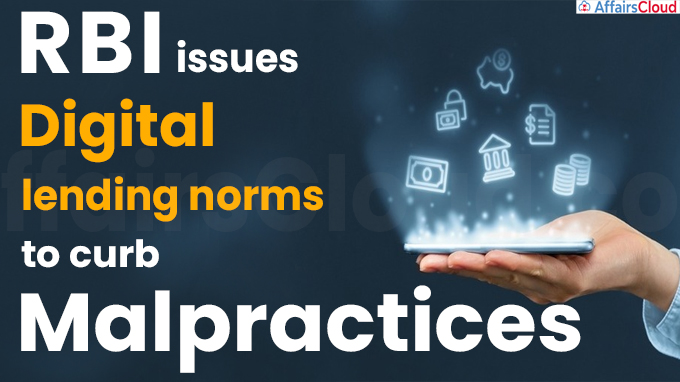
On August 10, 2022, the Reserve Bank of India (RBI) issued a regulatory framework to make digital lending safe for members of the public; curb malpractices; and to mitigate the concerns arising from credit delivery through digital lending methods.
- The framework is focused on the digital lending ecosystem comprising RBI Regulated Entities (REs) and the Lending Service Providers (LSPs) engaged by them to extend various permissible credit facilitation services.
Classifications of Digital lenders:
Digital lenders is classified into three groups –
i.Entities regulated by the RBI and permitted to carry out lending business
ii.Entities authorized to carry out lending as per other statutory/regulatory provisions but not regulated by RBI
iii.Entities lending outside the purview of any statutory/ regulatory provisions.
- These guidelines are for the i. category, or entities regulated by the RBI. As for other entities which are part of the ii. and iii. categories, the RBI has asked respective regulator/ controlling authority/ the central government to formulate guidelines based on the recommendations of the working group.
Background:
In January 2021, RBI constituted a Working Group on ‘digital lending including lending through online platforms and mobile apps’ (WGDL). The report submitted by the WGDL was placed on the RBI website for comments of stakeholders and members of the public. Taking into account the inputs received from stakeholders, the above mentioned regulatory framework has been setup.
Key Points from Framework:
i.All loan disbursals and repayments are required to be executed only between the bank accounts of the borrower and the RE, without any pool account of the LSP or any third party.
ii.Any fees, charges, payable to LSPs in the credit intermediation process will be paid directly by RE and not by the borrower.
iii.A Standardised Key Fact Statement (KFS) must be provided to the borrower before executing the loan contract. This has been mandated to be followed by REs, their LSPs, and Digital Lending Apps (DLAs) of REs, among others.
iv.The all-inclusive cost of digital loans in the form of an Annual Percentage Rate (APR) is required to be disclosed to the borrowers.
- APR should also form part of KFS.
v.The framework prohibits automatic increases in credit limits without the explicit consent of the borrower.
vi.It prescribes a look-up period during which the borrowers can exit digital loans by paying the principal and the proportionate APR without any penalty.
- It should be provided as part of the loan contract.
vii.If any complaint lodged by the borrower is not resolved by the RE within the stipulated period (currently 30 days), he/she can lodge a complaint under the Reserve Bank – Integrated Ombudsman Scheme (RB-IOS).
vii.Any lending sourced through Digital Lending Apps-DLAs (either of the RE or of the LSP engaged by RE) is required to be reported to Credit Information Companies (CICs) by REs irrespective of its nature or tenor.
Click Here for Official Framework
According to RBI’s working group on digital lending, the overall volume of disbursement through digital mode for the sampled entities (public sector banks, private sector banks, foreign banks, and NBFCs- Non-Banking Financial Company) exhibited a growth of more than twelvefold between 2017 and 2020 (from Rs 11,671 crore to Rs 1,41,821 crore).
RBI cancels banking licence of Rupee Co-operative Bank , Pune
RBI has cancelled the licence of Rupee Co-operative Bank Ltd, Pune in Maharashtra thereby prohibiting the bank from conducting the business of banking which includes acceptance of deposits and repayment of deposits as defined in Section 5(b) read with Section 56 of the Banking Regulation (BR) Act, 1949 w.e.f. September 22, 2022.
Reasons behind cancellation:
i.The bank does not have adequate capital and earning prospects as it does not comply with the provisions of Section 11(1) and Section 22 (3) (d) read with Section 56 of the BR Act, 1949.
ii.The bank has failed to comply with the requirements of Sections 22(3) (a), 22 (3) (b), 22(3)(c), 22(3) (d) and 22(3)(e) read with Section 56 of the Banking Regulation Act, 1949;
iii.The bank with its present financial position would be unable to pay its present depositors in full, and Public interest would be adversely affected.
Key point:
i.On liquidation, every depositor is entitled to receive deposit insurance claim amount of his/her deposits up to a monetary ceiling of RS 5,00,000 from Deposit Insurance and Credit Guarantee Corporation (DICGC) subject to the provisions of DICGC Act, 1961.
- More than 99% of the depositors of Rupee Co-operative Bank Ltd are entitled to receive full amount of their deposits from DICGC.
ii.As on May 18, 2022, DICGC has already paid Rs 700.44 crore of the total insured deposits under the provisions of Section 18A of the DICGC Act, 1961 based on the willingness received from the concerned depositors of the bank.
Recent Related News:
i.On 7th July 2022, RBI cancelled the licence of Shri Anand Co-operative Bank Limited, Chinchwad, Pune as the lender does not have enough capital to pay present depositors in full.
ii.On 4th July 2022 HDFC Bank received no objection letter from RBI for merging HDFC (Housing Development finance Corporation) Ltd and HDFC Bank. BSE Limited and NSE (National Stock Exchange) have also issued observation letters for the proposed merger.
About Deposit Insurance and Credit Guarantee Corporation (DICGC):
DICGC is a wholly-owned subsidiary of the Reserve Bank of India (RBI) which provides an insurance cover of up to Rs 5 lakh on bank deposits
Chairman – Michael Debabrata Patra(M.D.Patra)
Establishment – 15th July 1978
Headquarters – Mumbai, Maharashtra




